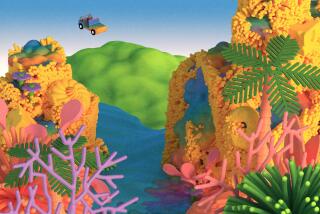A Second Look : Goodwill Drives an Engine of Change : HEARTS OF THE CITY: Exploring attitudes and issues behind the news.
- Share via
For a man who loves to muck around greasy car engines, Alfred Howard has dreamed up a rather ethereal New Age concept: the recycling of goodwill.
If you do something good, he reasons, you will make a positive change in the community. That will inspire others to build on your success with good deeds of their own. Which will, in turn, spark more good deeds. Eventually, the chain reaction will boost the whole neighborhood, and you will end up benefiting, too.
Howard’s theory has proved to be right on the money in the six weeks since The Times profiled his work at the Toyota Automotive Training Center. He has received call after call from people praising his good deeds--and volunteering their own help.
The Automotive Training Center, founded by Toyota Motor Sales U.S.A. and the Los Angeles Urban League in response to the 1992 riots, aims to teach top-notch mechanic skills and solid work habits to students of all ages. More than 200 students have graduated from the rigorous three-month program, and about 80% have found jobs working on air-conditioning or exhaust systems, performing tuneups, fixing brakes or selling car parts.
Since the article on the Crenshaw Boulevard center ran July 19, several repair shop supervisors have expressed interest in hiring graduates. A & B Chevy Service in Santa Monica donated two cars and a truck to the budding mechanics.
A businessman from Bell Gardens called to tell Howard that he owns warehouse space that would be suitable for service stations. He normally rents the space to well-established entrepreneurs with good credit ratings, he said, but he would be willing to work with Toyota Center graduates who are eager to set up their own auto repair shops.
Howard said: “Each one of these things may seem small, but for us, they are gigantic leaps.”
To Howard’s delight, a representative from the Southern California Indian Center recently arranged a tour of the center in hopes of sending young Native Americans to train there. So far, about 70% of the center’s students have been African American and about 25% Latino.
“These type of things allow us to recycle the good spirit in the community,” Howard said. “Everyone chips in their two cents worth to make the program work.”






